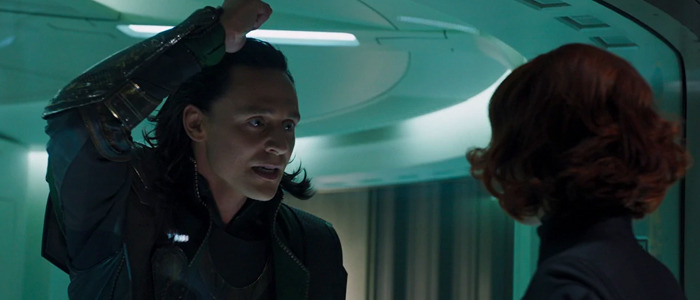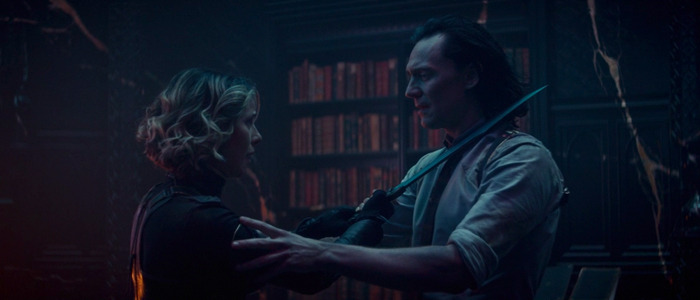The Problem With 'Loki' Is Simple: How Do You Trust A "Bad Guy"?
Warning: spoilers for the Loki season 1 finale ahead.
In the first season finale of Marvel Studios' Loki, Sylvie (Sophia Di Martino) and Loki (Tom Hiddleston) find themselves disagreeing after they're presented with significant information that they've been searching for. "Why aren't we seeing this the same way?" Sylvie asks. "Because you can't trust," Loki replies, "and I can't be trusted."
This dialogue is presented as a sad realization. Loki is disappointed that his relationship with Sylvie isn't as evolved as he thought, and he's dejected about the idea that the two characters have fallen back into their first impressions of one another. Emotionally, this exchange nearly erases the connections they've forged during their time together over the past several episodes. It's played as a downer moment.
But there was part of me that was nodding along with Loki's quote. And I may be in the minority, but I found that this show kept me at arm's length for its entire run because it is built around the Marvel Cinematic Universe's biggest trickster. Can the audience really ever trust Loki when we've previously seen him fool so many people?
The MCU's Biggest Trickster
There's a moment in Christopher Nolan's The Prestige that I think about all the time. Before the film's two rival magicians, Robert Angier (Hugh Jackman) and Alfred Borden (Christian Bale), become bitter enemies, they attend a performance in which an elderly, Asian magician seemingly produces a full fishbowl out of thin air on stage. After the show, Angier and Borden discreetly watch the magician leave through a side door. The man limps and is hunched over as he moves, seemingly requiring help to get into a carriage outside. "Look at the man!" Angier says, incredulous that Borden could think the magician could accomplish the trick by hiding the fishbowl between his legs. "This is the trick," Borden replies. "This is the performance, right here. This is why no one can detect his methods." The magician's devotion to his art runs so deep that he is almost always "performing" in order to preserve the illusion, even when he thinks people aren't watching.
Loki, of course, is familiar with that level of deception. Throughout his appearances in the MCU, he has cheated, enslaved, manipulated, schemed, betrayed people, and faked his own death. He's the God of Mischief, and previous movies have shown time and time again that nothing is what it seems when it comes to Loki. He wanted to be imprisoned on that helicarrier in The Avengers. He stole Odin's identity at the end of Thor: The Dark World. The list goes on.
Trusting a Deceiver: Easier Said Than Done
For me, the biggest problem with Loki is that this series requires the audience to place our trust in an inherently untrustworthy character. The show knows this – the finale makes it explicit, with Sylvie and Loki coming to blows as their clashing world views are laid out in that scene I mentioned above. But the previous movies had already done so much work to establish Loki as the ultimate "gotcha" character that even when he gave Mobius (Owen Wilson) a hug in The Void in the fifth episode, a tiny part of me wondered if Loki would stab Mobius in that embrace, just for the shock value, and then explain that it was all part of some sort of grand plan that was being held back from the audience until the perfect moment.
Hiddleston did great work as a version of this character who experienced profound change and growth, but as a viewer, I could only appreciate those changes after the credits rolled on the finale, when I definitively knew that he didn't have any final tricks up his sleeve. There are moments I think back on, where he's pouring his emotions into interactions he had with Sylvie, that I wish I could have fully engaged with in the moment without there being a nagging question of whether or not those emotions were all part of an elaborate act.
If con man movies have taught me anything, it's that ultra-smart characters are always operating on another level, even factoring in what look like failures as parts of their cons, all the while knowing that those struggles were all part of the plan. As the MCU's ultimate con man, I simply could not trust that Loki wasn't waiting to pull back the curtain and unveil that his actions were part of some next-level scheme. Now that I know how things shake out, I think Loki will have the best re-watchability of any of Marvel's Disney+ shows thus far. It's just a shame that the looming possibility of the rug being pulled out from under the audience made me spend so much time concentrating watching Loki's hands metaphorically reaching for the edge of the rug instead of being able to focus on the character beats that were at the real core of the show.
Loki's complete first season is now streaming on Disney+.


